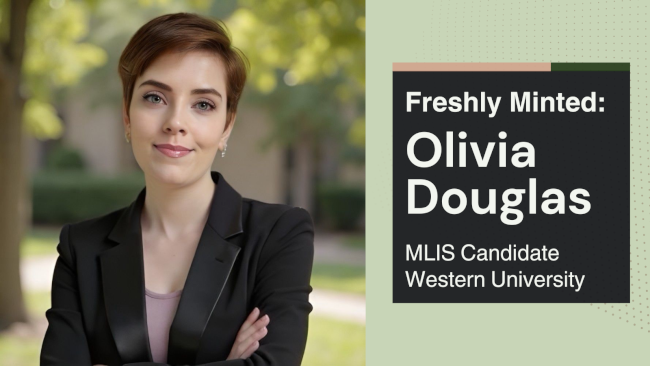
Freshly Minted: Olivia Douglas
July 31, 2025
MLIS Candidate, Faculty of Information and Media Studies, Western University
Which information studies program are you attending?
I am completing a Master’s in Library & Information Science degree at Western University. I will have officially completed my final semester in August 2025.
What are your current classes like? Which is your favourite so far, and why?
My current MLIS classes encompass a wide range of topics that blend theory with practical application. I’m studying information policy, which focuses on how laws and ethics shape information access and privacy. Information management, where we explore organizing and governing information within organizations; collections management, which looks at how libraries build and maintain meaningful collections. I’m also learning database design and querying in database management, as well as how to support public health through reliable, accessible resources in health consumer information. Each course challenges me to think critically and apply what I learn to real-world library and information settings.
My favorite course so far is Information Management because it combines strategy, organization, and problem-solving. I enjoy learning how to structure and govern information effectively to support decision-making and improve access within organizations. It’s practical, forward-thinking, and directly connected to real-world challenges in the information field. I would highly encourage anyone to take a course like this.
Is there one aspect of the profession that surprises you that you were not expecting when you started the program? What is it?
What surprised me the most is how broad and interdisciplinary the information profession really is. I expected to focus mostly on libraries, but I’ve discovered how much opportunity there is in areas like data governance, policy development, health information, and digital infrastructure. Information professionals play key roles in many sectors beyond traditional library settings.
What was it that initially drove you to librarianship?
I have loved reading and visiting libraries ever since I was a child; they have always felt like places of discovery and inspiration. While working as a Teacher Assistant at the University of Guelph, I found myself spending a lot of time helping students understand the value of the campus library and teaching them how to navigate databases to find credible sources. That experience showed me how much I enjoy connecting people with information. Combined with my passion for history and time spent exploring the museum field, all signs pointed me toward a career in libraries. It felt like a natural and fulfilling destination.
If you could work anywhere, and do anything with information, what would your dream job look like?
I found this to be a tough question as I am fascinated with many different information professional roles. However, my dream job would be working in a Special Collections department, handling old and rare materials. It brings together so many of my passions, my love for history, my appreciation for preservation, and my desire to connect people with meaningful information. I would love to help students and researchers access unique resources, uncover forgotten stories, and engage deeply with the past.
If someone were considering going to information studies, what would you advise them about?
I would tell anyone interested in library school that it is more diverse and dynamic than they might expect. It’s not just about books but about information in all its forms. I encourage them to explore different areas, stay open to unexpected interests, and take advantage of hands-on experience. Most importantly, bring your curiosity, empathy, and a willingness to adapt, as it will serve you well in this field.
What do you think is the most important aspect of being an information professional today?
I think the most important aspect of being an information professional today is ensuring equitable access to reliable, accurate, and ethically managed information. In a world of rapid technological change and misinformation, our role is not only to organize and preserve information, but also to empower people to find, understand, and use it effectively. That means staying adaptable, being digitally literate, and always centring the needs of the communities we serve.
Add a new comment